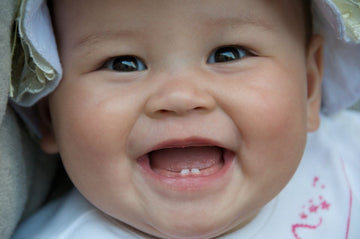When Do Baby Teeth Erupt? A Month-by-Month Guide for New Parents
By Dr. Ashley Lerman
Wondering when your baby’s first teeth will make an appearance? Those tiny teeth—also called baby teeth, primary teeth, or milk teeth—are an exciting milestone, but the process can bring lots of questions. Don’t worry, I’ve got you covered with this easy month-by-month guide to help you know what to expect.
Let’s dive into the timeline, symptoms, and tips to make teething easier for you and your little one.
What Are Baby Teeth and Why Do They Matter?
Baby teeth play a big role in your child’s development. They’re not just placeholders for permanent teeth—they help your baby chew, speak, and smile. Plus, they save space for adult teeth and guide them into place as your child grows.
Caring for baby teeth is super important to prevent cavities and to set the stage for lifelong oral health.
Baby Teeth Eruption Timeline
Your baby will grow a total of 20 baby teeth, and while every child is different, here’s a typical timeline to follow:
Month-by-Month Baby Teeth Timeline
| Tooth | Age It Erupts | Purpose |
|---|---|---|
| Lower central incisor | 6–10 months | Helps bite into food |
| Upper central incisor | 8–12 months | Helps bite into food |
| Upper lateral incisor | 9–13 months | Cuts food |
| Lower lateral incisor | 10–16 months | Cuts food |
| First molars (top/bottom) | 13–19 months (top) | Chews and grinds food |
| 14–18 months (bottom) | ||
| Canines (cuspids) | 16–23 months | Tears food |
| Second molars (top/bottom) | 23–33 months | Additional grinding |
Pro Tip:
Teeth usually come in pairs—one on the left and one on the right.
Signs Your Baby Is Teething
Teething symptoms can show up a few weeks before a tooth actually breaks through. Common signs include:
Drooling (lots of it!)Gum irritation
Fussiness or irritability
Low-grade fever
Chewing on toys, fingers, or anything in sight
While these are normal symptoms, keep in mind that severe fever, diarrhea, or sleep issues aren’t usually caused by teething. If you notice these symptoms, it’s best to check with your pediatrician.
How to Soothe a Teething Baby
Teething can be tough, but there are safe and effective ways to help your baby feel better:
Safe Remedies:Gently massage their gums with a clean finger.
Offer a firm rubber teething ring (avoid liquid-filled ones that can break).
Try a cool, damp washcloth for them to chew on.
What to Avoid:
Teething gels/creams: Products with benzocaine are not safe for babies.Teething jewelry: Small parts can be a choking hazard.
If your baby seems very uncomfortable, you can ask your pediatrician about using ibuprofen or acetaminophen.
Shedding Baby Teeth
Baby teeth usually start to fall out (also known as shedding) around age 6. This process continues until most adult teeth have come in by age 13. Here’s when those baby teeth might fall out:
| Tooth | Age It Sheds |
| Lower/upper central incisors | 6–7 years |
| Lower/upper lateral incisors | 7–8 years |
| First molars (top/bottom) | 9–11 years |
| Canines (cuspids) | 10–12 years |
| Second molars (top/bottom) | 10–12 years |
Pro Tip: Keep brushing and flossing even as teeth are shedding to keep gums healthy and ready for permanent teeth.
FAQs About Baby Teeth Erupting
1. When should I start brushing my baby’s teeth?
As soon as the first tooth erupts! Use a smear (rice-grain-sized) amount of fluoride toothpaste and a soft-bristled brush.
2. Do I need to take my baby to the dentist?
Yes! Schedule your baby’s first dental visit by their first birthday or within 6 months of their first tooth erupting.
3. What if my baby has no teeth at 12 months?
Some babies take longer to start teething. If no teeth have erupted by 15 months, check with a pediatric dentist.
4. Can teething cause a fever?
Teething might cause a low-grade fever, but anything over 100.4°F is likely due to something else.
5. Why are baby teeth important if they’re just going to fall out?
Baby teeth help with chewing, speaking, and holding space for adult teeth. Taking care of them helps set the stage for a healthy smile.
How Firstgrin Can Help
At Firstgrin, we’re all about making oral health simple and stress-free for parents. Our Firstgrin Baby Dental Care Kit includes everything you need to start your baby’s oral health journey, like a silicone finger brush, a teether, a muslin cloth, and an age-appropriate toothbrush.
We also offer a companion app packed with expert tips, reminders, and a cavity risk quiz. Plus, our resources are designed by pediatric dental professionals (that’s me!).
Visit Firstgrin to learn more and get started today.





